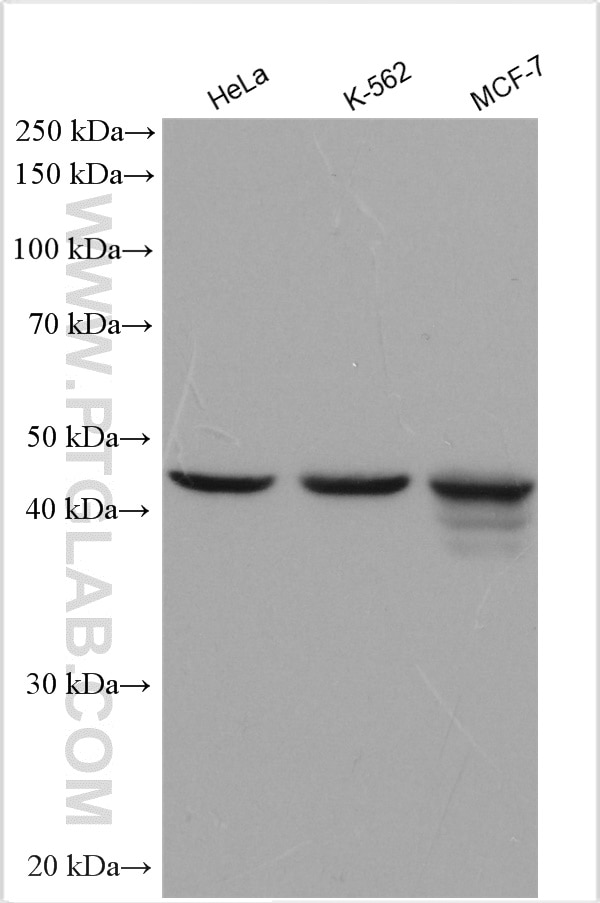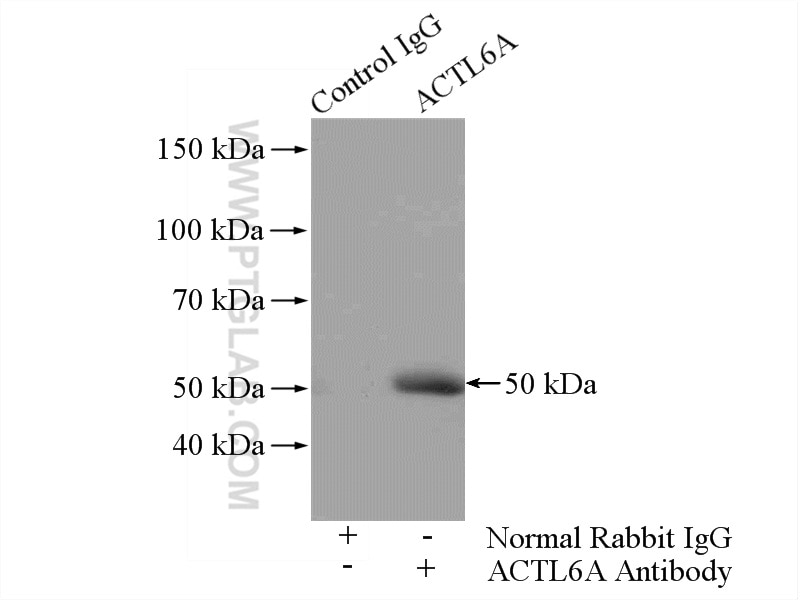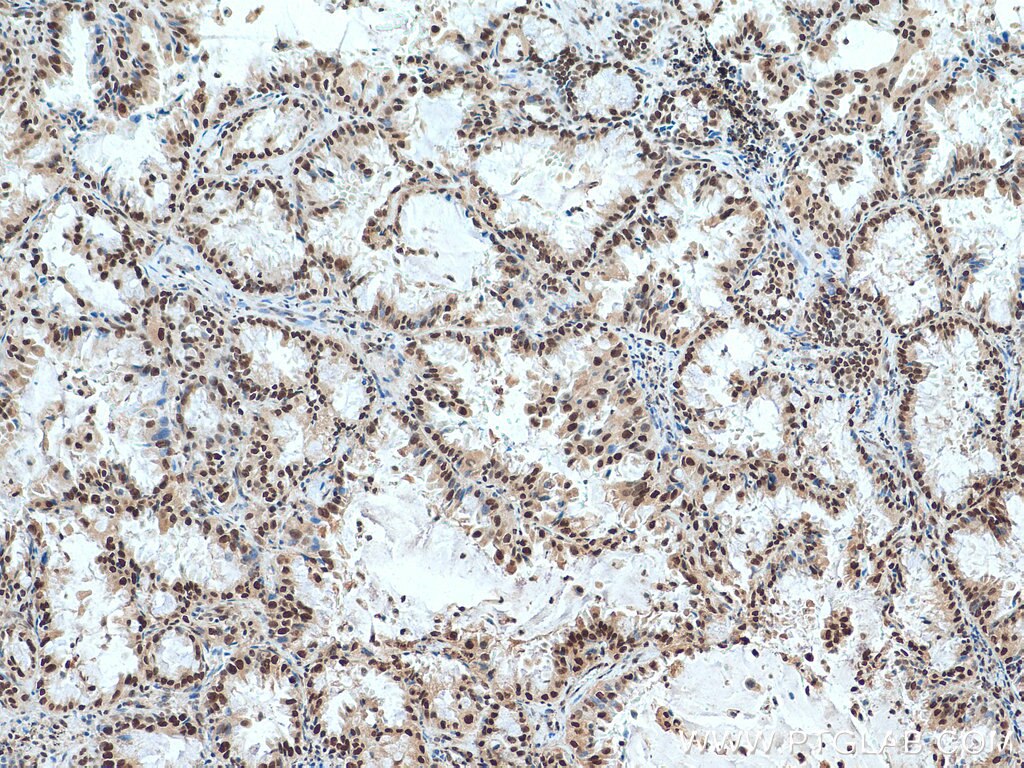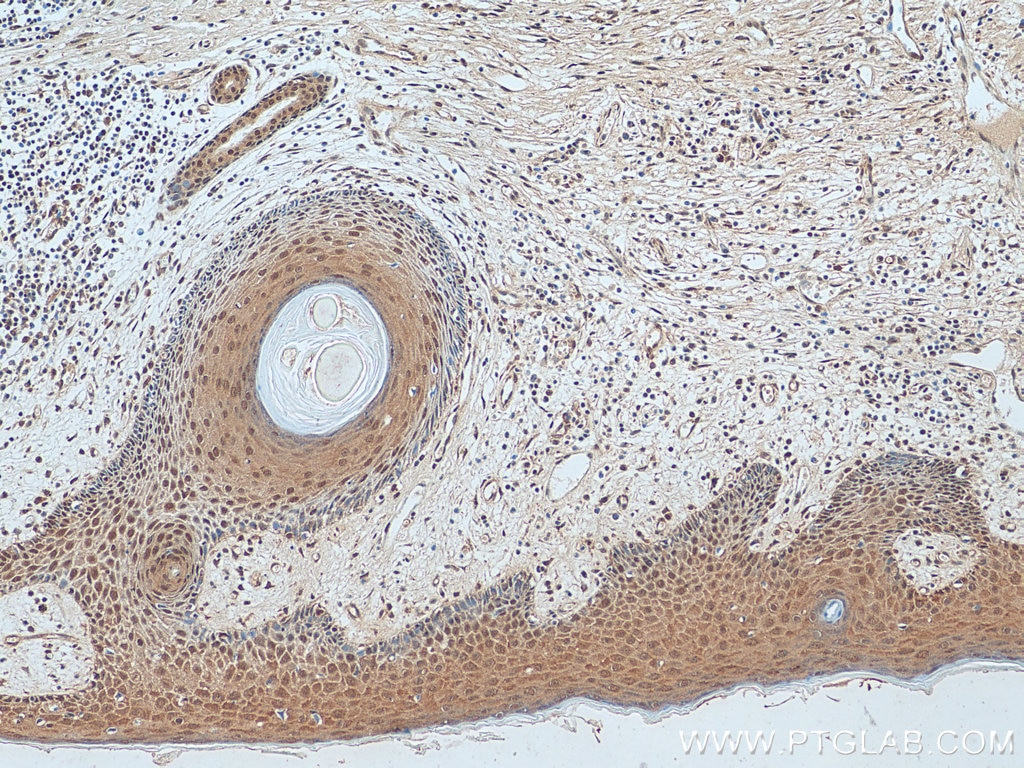Tested Applications
| Positive WB detected in | HeLa cells, K-562 cells, MCF-7 cells |
| Positive IP detected in | HeLa cells |
| Positive IHC detected in | human lung cancer tissue, human skin cancer tissue Note: suggested antigen retrieval with TE buffer pH 9.0; (*) Alternatively, antigen retrieval may be performed with citrate buffer pH 6.0 |
Recommended dilution
| Application | Dilution |
|---|---|
| Western Blot (WB) | WB : 1:2000-1:16000 |
| Immunoprecipitation (IP) | IP : 0.5-4.0 ug for 1.0-3.0 mg of total protein lysate |
| Immunohistochemistry (IHC) | IHC : 1:50-1:500 |
| It is recommended that this reagent should be titrated in each testing system to obtain optimal results. | |
| Sample-dependent, Check data in validation data gallery. | |
Published Applications
| KD/KO | See 1 publications below |
| WB | See 9 publications below |
| IHC | See 1 publications below |
| IF | See 1 publications below |
Product Information
10341-1-AP targets ACTL6A in WB, IHC, IF, IP, ELISA applications and shows reactivity with human, mouse, rat samples.
| Tested Reactivity | human, mouse, rat |
| Cited Reactivity | human, mouse |
| Host / Isotype | Rabbit / IgG |
| Class | Polyclonal |
| Type | Antibody |
| Immunogen | ACTL6A fusion protein Ag0323 Predict reactive species |
| Full Name | actin-like 6A |
| Calculated Molecular Weight | 47 kDa |
| Observed Molecular Weight | 45-51 kDa |
| GenBank Accession Number | BC001391 |
| Gene Symbol | ACTL6A |
| Gene ID (NCBI) | 86 |
| RRID | AB_2289267 |
| Conjugate | Unconjugated |
| Form | Liquid |
| Purification Method | Antigen affinity purification |
| UNIPROT ID | O96019 |
| Storage Buffer | PBS with 0.02% sodium azide and 50% glycerol , pH 7.3 |
| Storage Conditions | Store at -20°C. Stable for one year after shipment. Aliquoting is unnecessary for -20oC storage. 20ul sizes contain 0.1% BSA. |
Background Information
Actin-like 6A (ACTL6A, synonyms: ACTL6, BAF53A, MGC5382) is a family member of actin-related proteins (ARPs), which share significant amino acid sequence identity to conventional actins. Both actins and ARPs have an actin fold, which is an ATP-binding cleft, as a common feature. The ARPs are involved in diverse cellular processes, including vesicular transport, spindle orientation, nuclear migration and chromatin remodeling. ACTL6A is a 53 kDa subunit protein of the BAF (BRG1/brm-associated factor) complex in mammals, which is functionally related to SWI/SNF complex in S. cerevisiae and Drosophila; the latter is thought to facilitate transcriptional activation of specific genes by antagonizing chromatin-mediated transcriptional repression. Together with beta-actin, it is required for maximal ATPase activity of BRG1, and for the association of the BAF complex with chromatin/matrix.
Protocols
| Product Specific Protocols | |
|---|---|
| WB protocol for ACTL6A antibody 10341-1-AP | Download protocol |
| IHC protocol for ACTL6A antibody 10341-1-AP | Download protocol |
| IP protocol for ACTL6A antibody 10341-1-AP | Download protocol |
| Standard Protocols | |
|---|---|
| Click here to view our Standard Protocols |
Publications
| Species | Application | Title |
|---|---|---|
Nat Med Baf60c drives glycolytic metabolism in the muscle and improves systemic glucose homeostasis through Deptor-mediated Akt activation. | ||
Cell Metab Genome-wide coactivation analysis of PGC-1alpha identifies BAF60a as a regulator of hepatic lipid metabolism. | ||
Cell Rep A Diet-Sensitive BAF60a-Mediated Pathway Links Hepatic Bile Acid Metabolism to Cholesterol Absorption and Atherosclerosis. | ||
Phytomedicine Corilagin alleviated intestinal ischemia-reperfusion injury by modulating endoplasmic reticulum stress via bonding with Bip | ||
Ann Gastroenterol Surg Circ_0084615 promotes epithelial-mesenchymal transition-mediated tumor progression in hepatocellular carcinoma |









